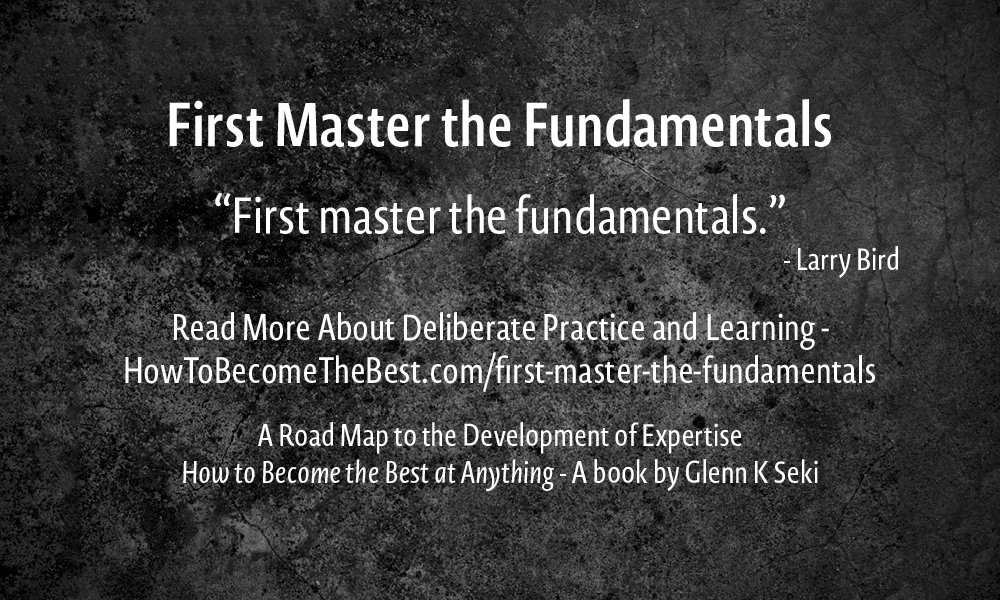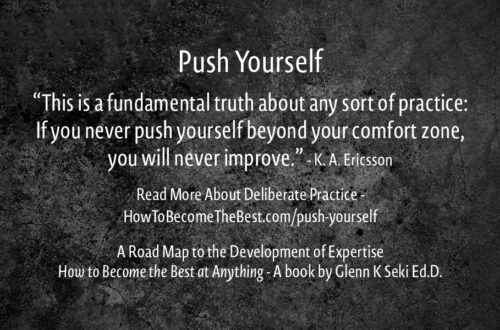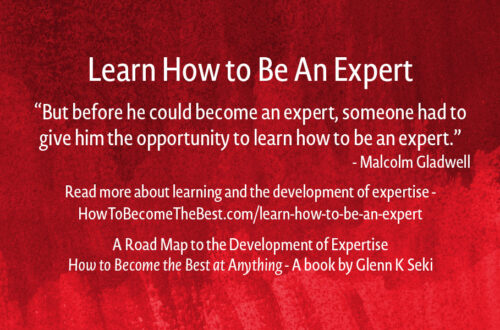“First master the fundamentals.” – Larry Bird
To master the fundamentals it takes practice, practice, and more practice…
Deliberate Practice and Learning
An excerpt from How To Become The Best at Anything, Chapter 8, Deliberate Practice and Learning
“To become the best takes practice, lots and lots of practice. I have mentioned the 10,000-hour rule. It takes about 10,000 hours of practice to get really good at something and not just any type of practice, but deliberate practice. Deliberate practice is practicing to get better.
The classic example is a man who has gone golfing almost every weekend for the past twenty years. He has a great interest in the sport and has fun with it. He reaches a certain level of expertise and plateaus there after about seven years. He is good enough to win occasionally playing, against his friends. He has fun, although after twenty years of practice why hasn’t he become a great golfer? Because he was not practicing to get better, he was not using deliberate practice, he was just participating in the sport. When you practice, you need to be practicing something that will help you become better.
10,000 hours of practice comes out to about 5 to 6 hours a day, 4 to 6 days a week, for 7 to 10 years of deliberate practice. That’s what it takes to become one of the best, depending on the domain. This is a lot of deliberate practice!
What if you want to become the best in a domain that is a new sport or profession? If levels of expertise have not been fully established, then you can become the best in far fewer hours of deliberate practice. This is because no one has practiced and established themselves in the domain yet. The bar of expertise is being reset all the time. As time goes by, the 10,000 hours will be reached, and fully automated sequences will be in place making it harder for novices to attain high levels of expertise. Those that started first in the new sport or profession, as long as they continue to improve, will remain on top.”
Learning
“When you are trying to learn something new or you are teaching someone something new, it can be a very daunting task. It is difficult because learning something new is not easy, but it can be made easier if you understand how learning works.
Learning can be divided into four basic parts: concepts (definitions and examples), processes (how it works sequences), principles (cause and effect relationships), and productions (procedures/classifications).”
Concepts
“Here’s a common example of a concept: a chair. You can look at one and tell right away that it is a chair. A chair can have four legs, three legs, two legs, one leg, or no legs. A chair can have more than four legs. Your memory stores a definition and examples of chairs. You have learned the concept of a chair. To learn a new concept, you need a definition and examples of the concept.
Learning a concept sounds easy, and it is. However, you can run into problems when you have a lot of new concepts to learn in a short amount of time. In a typical high school biology class, a student will be given more vocabulary to learn (concepts) than in an average first-year high school foreign language class. I taught high school biology and many of my students struggled with the vocabulary. I would help them learn the new concepts by presenting them in different ways. They would first be exposed to the new concepts in their homework. Then in a lab, then in an exercise, and then in group work that would push them to apply the concepts in different ways and would show them how the concepts fit in with processes, principles, and productions.”
Read the book to learn more about bad habits and automaticity, affirmations, processes, principles, productions, etc.





